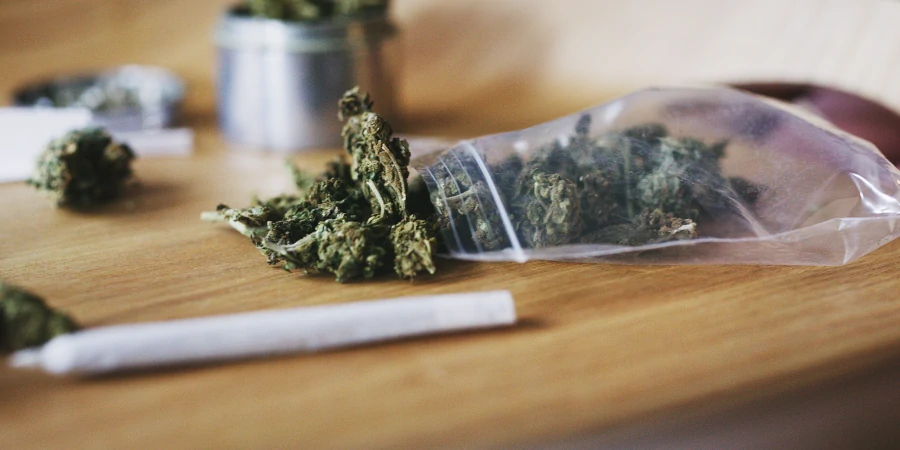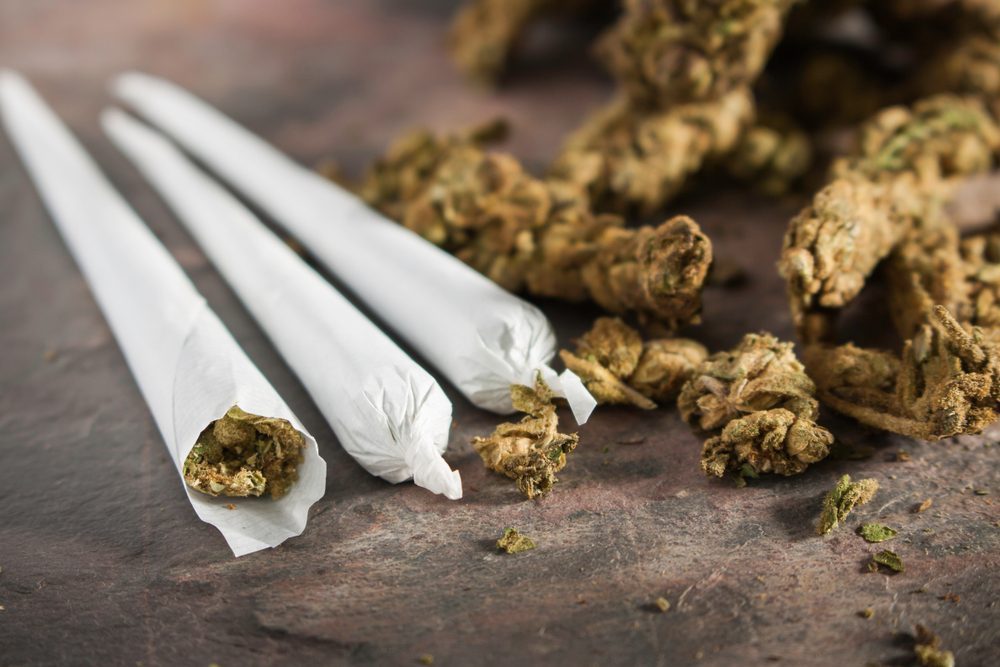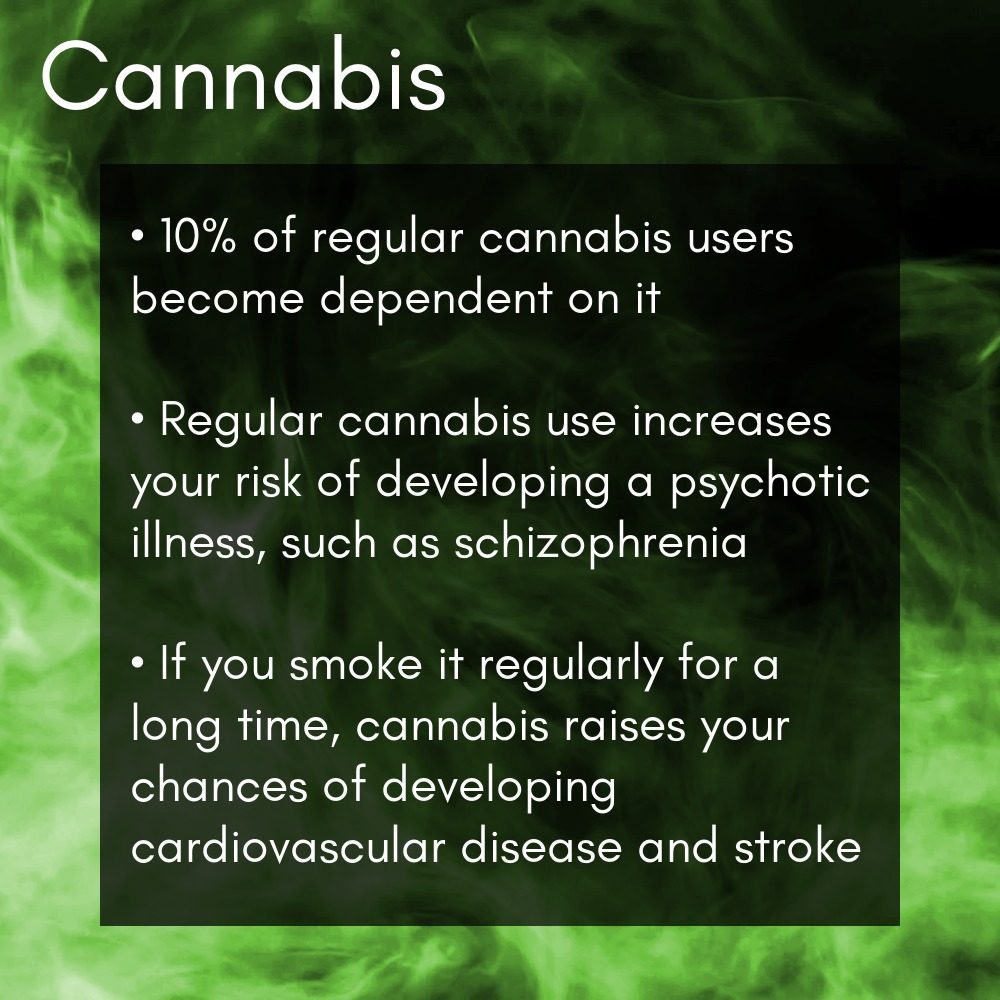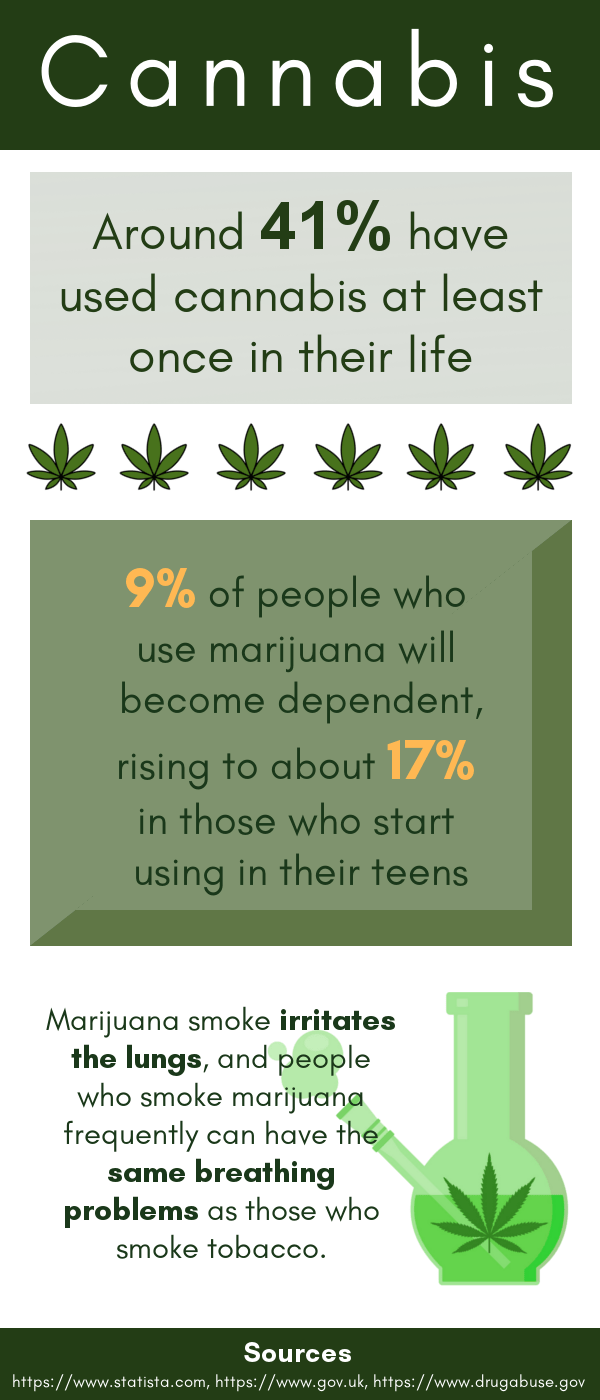0207 205 2845 0207 205 2845


Understanding cannabis addiction, the signs and symptoms of dependence on weed can help us to deal with the many issues that it can cause.
There is a substance which is the most widely used illegal drug in the UK. It is referred to by many different names, from marijuana, pot and dope to weed, grass, hash and Mary Jane, among others.
It is a naturally occurring drug made from the plant which bears its name, but how much do you know about cannabis?
Cannabis is derived from the cannabis plant, otherwise known as cannabis Sativa, a flowering plant from the Cannabaceae family. A variety of compounds, such as hashish and hash oil, are extracted from the plant. It is said to originate from and be indigenous to both South and Central Asia, meaning it grows wild in temperate and tropical climates. However, the fact is that growing cannabis can now be done almost anywhere due to innovations in indoor hydroponic technology.
The principal active ingredient of cannabis, its main psychoactive constituent, is tetrahydrocannabinol or THC. It is the mind-altering chemical in the plant which brings on most of the psychological effects of marijuana. It replicates the cannabinoid chemicals produced naturally by the human body.
If you are looking for help with cannabis addiction, you could speak to your GP or choose drug detox therapy by contacting Rehab Guide. We can treat all types of addictions along with cannabis dependence. You could decide on an outpatient or inpatient rehab treatment, where you can undergo detoxification and counselling as part of an ongoing rehabilitation programme. It could be your first step to getting clean and putting your marijuana dependency under control.

Marijuana refers to the leaf and flowering tops of the cannabis plants, Cannabis Sativa and Cannabis Indica. These are probably not truly separate species but variants of a single species that originated in Asia and is now found throughout the world. C. Sativa, the more common of the two, grows quickly and can reach a height of up to 15 feet. From seed to maturity, it takes three to five months outdoors and as little as 60 days to grow indoors under ideal heat and light conditions.
Historically, in the cannabis hemp business, it was grown to produce hemp for clothing, rope, paper and other materials. The shorter variant, C. indica, has been cultivated in the Middle East for the psychoactive properties of its resins. It reaches about four feet in height and is bushier in appearance. People who have never tried the drug often wonder, what does cannabis smell like? The dried drug has a distinctive smell that varies according to the strain, with some having a strong pine or mint fragrance and others a skunk odour.

Archaeological evidence shows that marijuana was used in China 12,000 years ago and then spread to the Middle East, North Africa, and Europe. During the centuries of European conquest and colonisation, its use extended to almost every county. In the United States, marijuana has a long history both as a medicinal tonic and as a recreational drug. The medical use reached a peak in the 19th century and then almost disappeared with the development of new medications. Medical cannabis is now again attracting interests as a remedy for people suffering from HIV, cancer, multiple sclerosis, and many other illnesses.
In the UK, recreational cannabis is an illegal class B drug under the Misuse of Drugs Act of 1971. It is illegal to possess, sell or giveaways.
Cannabis of all strains is currently legal in many other countries, including countries in the EU, and there has been much controversy as to whether or not it should be made legal in the UK.
In the rest of the world, attitudes to marijuana range from open tolerance to severe penalties, including death. Of the industrialized countries, the most liberal is the Netherlands.
The Netherlands has pioneered an approach that attempts to control drug addiction and drug abuse while avoiding the criminality associated with the use of illegal drugs. Marijuana and hashish are technically illegal, but about 1200 coffee shops are permitted to sell up to five grams (previously 30 grams, or about one ounce) to anyone over 16 years of age.
In November 2018, medicinal cannabis was legalised in the UK for the use or treatment of exceptional cases and only when prescribed by a consultant or physician.
Medicinal cannabis is very different from street/recreational cannabis, and it is heavily regulated and monitored to ensure patient safety.
In England and Wales, 30% – that’s around 10 million – adults aged 16 to 64 have used the drug recreationally at least once, according to the annual crime survey.

The psychoactive parts of marijuana – the cannabinoids, including THC – are not water-soluble and, therefore, cannot be injected but have to be smoked or ingested.
The most common way of using marijuana is by smoking it, either in a cannabis pipe or in a thinly rolled cigarette, commonly referred to as a joint. These can easily fall apart, and the smoke may be harsh, so many users empty a sturdy type of cigar or cigarette of its tobacco and replace it with marijuana. The result is known as a blunt, more stable than a cigarette and with a fragrant cigar smoke that helps mask the sweet smell of the marijuana.
Much like tobacco, marijuana varies in potency depending on the type of plant, the way it is harvested, and the after-harvest processing. Marijuana grown in the United States was once considered inferior because of a low concentration of THC (delta-9-tetrahydrocannabinol, the major psychoactive ingredient). The most potent marijuana came from tropical areas such as Mexico and Hawaii –It was particularly popular in the tourist resorts of Acapulco and Maui.
‘Pot’ probably comes from potiguaya, Mexican slang for marijuana.
When mature, marijuana appears as a green leafy bush; it has a significant odour. The most distinctive feature is the shape of the serrated cannabis leaf, which may be wide or narrow and has three, five, seven, or a higher odd number of blades. The plant is harvested, ideally, when the resin glands begin to lose their lustre and show a born discolouration. The amount of time it takes to dry cannabis and cure it depends on the environment, technique and quantity of plants.
Hashish is the dried resin from the cannabis flower and commonly contains up to 10 per cent resin. Most hashish, however, is not pure resin and contains carrying amounts of other fibrous plant material. It is a dark-coloured gummy ball that is rather hard but not brittle.
Hashish was developed in the Middle East and became popular throughout Northern Africa and Europe. Most hashish is smuggled into the United States from Pakistan, Nepal, Afghanistan, and Lebanon.
Hash oil, or ‘cannabis oil’, is made by boiling hash or marijuana in a solvent such as alcohol, gasoline, or kerosene, which absorbs THVC. The sediment is then removed by filtering, resulting in a thick liquid that caries in odour and ranges in colour from clear to yellow, dark brown, or black, depending on the process. Hash oil typically contains about 15-30 per cent THC, with reports as high as 70 per cent.
Marijuana joints may be sprinkled with PCP or crack cocaine, or dipped in Formaldehyde (embalming fluid), to obtain a more intense hallucinogenic or stimulating experience. This practice is common in the eastern United States.
Cannabis contains 421 chemicals in 18 different chemical classes. Among these are 61 cannabinoids that are found in no other plants. Burning marijuana during smoking creates hundreds of additional compounds.
The effects of smoking marijuana begin in a few minutes, peak at 15-45 minutes, and then gradually diminish over two to six hours. Typically, the effects include euphoria, relaxed inhibitions, increased appetite, and disorientation. There may also be dry mouth and throat, dizziness, and increased visual and auditory awareness.
Concentration, learning, perception, and fine muscle skills are somewhat impaired. Although the initial high may be gone within hours, some of the effects of marijuana on mental and physical functioning may be quite subtle and last for days. Studies of experienced pilots in a flight simulator showed a deficiency up to 24 hours later.
Weed does not cause physical addiction. There is an active debate, however, about whether marijuana should be considered to cause psychological addiction. For reasons that are not clear, some users do develop the compulsive behaviour that is characteristic of addiction, although to a much smaller degree than with other addictive drugs. Not everyone who uses the drug will suffer from addiction, but it does happen to some.
In the last 30 years, the potency of marijuana has increased. THC concentration, the part of marijuana attributed to some of the “stoned” effects, had increased from 3 to 4% (in the 1990s) to more than 15% in 2018.
Using more potent marijuana will likely result in more potent marijuana effects.

Many addiction experts and specialists claim that it is not the substance itself that induces addiction, more so the person’s intrinsic vulnerability to addiction.
Marijuana has become so widespread these days that some people do not fully appreciate the dangers. It is almost seen as part of everyday life or an active social scene, like having a drink. However, you can build up an addiction if you take it long enough. It is also possible to develop a tolerance to the drug where you will have to take more for the desired effect. If you stop taking cannabis, you could experience a wide range of addiction and withdrawal symptoms, from cravings and mood swings to irritability and restlessness.
There are many common misconceptions; some say urban myths about taking weed. They think it is safe to use because it is natural. Some people consider it almost commonplace, as if it is not a serious drug. They often dispute the claim it can be addictive and a gateway drug, leading you to take more dangerous substances like heroin or cocaine.
The drug affects people in many ways. There is the outward sheen on the surface, the initial high you were looking for, but that doesn’t change the fact taking weed can have a long-lasting detrimental impact on your mental and physical health, as well as affecting your working and personal relationships. It can be hard for some people to recognise how much weed addiction could disrupt their lives.
Synthetic cannabinoids are sometimes misleadingly called fake weed because they act on the same brain cell receptors as THC, the mind-altering component in cannabis.
Initially, weed can make you feel elated, chilled out and relaxed. It can make you feel happy and euphoric and put you at ease. You can become excitable and talkative and get a fit of the giggles where you cannot stop laughing, but there is nothing funny about it. It is also commonplace to feel incredibly hungry when you smoke weed. It is as if you have been afflicted with sudden hunger pangs, where you have a craving to get something to eat and go snacking, known as “the munchies”.
The immediate effects of taking marijuana include rapid heartbeat, disorientation, and lack of physical coordination, often followed by depression or sleepiness. Some users suffer panic attacks or anxiety.
But the problem does not end there. According to scientific studies, the active ingredient in cannabis, THC, remains in the body for weeks or longer.
Marijuana smoke contains 50% to 70% more cancer-causing substances than tobacco smoke. One major research study reported that a single cannabis joint could cause as much damage to the lungs as up to five regular cigarettes smoked one after another. Long-time joint smokers often suffer from bronchitis, an inflammation of the respiratory tract.
If you smoke cannabis with tobacco, you also run the risks of illnesses associated with smoking, from coughing and bronchitis to chronic pulmonary obstructive disease (COPD). There is a possibility of high blood pressure, heart disease, stroke and cancer, alongside other conditions.
Cannabis smoke has as much tar, carbon monoxide, cyanide, and other toxic material as tobacco smoke. The two most potent cancer-causing agents in tobacco smoke, benzanthracene and benzpyrene, are present in even higher amounts in marijuana smoke. Because marijuana smokers tend to inhale more deeply, they absorb about five times as much carbon monoxide and tar than tobacco smokers.
Overall, the combination of heavy tobacco use and marijuana is far worse for each individual.
Mixing cannabis with alcohol can enhance the effects of THC, and overdose on THC can be very harmful, especially in younger people.
Both alcohol and cannabis can diminish a person’s capability to think reasonably. Because these drugs interact with each other, mixing them can result in an increased likelihood of acting impulsively, having bad judgment, or engaging in actions that can lead to accidents and serious results. Combining these two drugs also increases the potential for drug-related blackouts, memory issues, and long-term cognitive difficulties that are connected with the use of both of these drugs.

Studies show that the mental functions of people who have smoked a lot of marijuana tend to be diminished. The THC in marijuana disrupts nerve cells in the brain, affecting memory.
According to one study, smoking marijuana could ultimately subdue the body’s immune system, making the user more receptive to certain types of cancer and infections.
It is illegal to drive under the influence of marijuana. Marijuana has effects that can slow your reactions towards a stimulus. It can also reduce your ability to make responsible decisions and impair you both cognitively and physically.
The drug driving law carries the same penalties as drunk driving in the UK.
There are various negative side effects to taking the drug you should be aware of. Weed can make you feel drowsy and lethargic, as if you have no energy.
Those with an addiction often endure the resulting physical symptoms.
Users often can lose concentration and become disinterested in other aspects of their life, from hobbies and pastimes, to even their family life and work. They can become disassociated, irritable and aggressive, as well as feeling suspicious and panicky. It is not unheard of for users to suffer panic attacks.
They can also suffer from anxiety, depression and paranoia for hours or days at a time while they continue to take cannabis. The drug has also been linked with mental health issues. It has been said if you take it over a long period of time, there is a greater chance of developing schizophrenia or suffering a relapse if you are already living with the illness. According to the National Institute on Drug Abuse (NIDA), people who start using marijuana at a young age, and who are heavy users are more prone to acquire an addiction than some other users.
The drug can affect more than your physical health. Studies in Australia in 2008 linked years of heavy marijuana use to brain abnormalities. This is backed up by earlier research on the long-term effects of marijuana, which indicate changes in the brain similar to those caused by long-term abuse of other major drugs. And some studies have shown a connection between continued marijuana use and psychosis.
It can also alter your brain chemistry and how it works, as it is considered a sedative and hallucinogenic. You may see or hear things which are not there, which can be terrifying. If you have an addiction, you could have memory problems and find it hard to get to sleep. It can alter your mood and behaviour and affect your motivation.
Researchers have been studying the possible benefits of cannabinoids for managing various health conditions.
These include autoimmune disease, inflammation, pain, seizure disorders, psychiatric disorders, substance use disorders, withdrawal, and dependence.
In November 2018, medicinal cannabis was legalised in the UK for the use or treatment of exceptional cases and only when prescribed by a consultant or physician.
Medicinal cannabis is very different from street/recreational cannabis, and it is heavily regulated and monitored to ensure patient safety.
The drug is called Epidyolex, and it is a medication that originates from marijuana. It is a purified cannabidiol that does not contain THC.
Cannabinoids are readily absorbed from the lungs and the gastrointestinal tract. They enter the circulation and are stored and accumulated in fatty tissue, and then gradually excreted from the body. The half-life of THC has been estimated at anywhere from 18-48 hours. A person who smokes marijuana for the first time may test positive for one to three days. Because THC accumulates, a frequent marijuana user can test positive for more than four weeks after the last use. For daily users, weed may be detectable for several months after the last use. The longest reported detection times are more than 90 days.
Weed detection depends on how much you smoke or ingest, as well as how often. In overall, higher doses and more regular use are associated with longer detection times.
Feeling the effects of cannabis requires a high level of the drug in your system. How much that is varies from person to person based on metabolism, weight and hydration. Typically, you can expect to feel ‘stoned’ for around 2-6 hours, although you can be impaired for longer.
The length will depend not only on your physiology but also on the strength of the cannabis and how much you take. There are many types of cannabis with very high levels of THC, which may leave you feeling the effects for much longer.
How you take, it will also have an impact on how long you feel under the influence. Generally, quicker effects from methods such as smoking or inhaling will last a shorter time, but slower ways, including eating cannabis, will last longer with a less immediate and weaker effect.
Abrupt withdrawal from cannabis can be uncomfortable but not life-threatening.
Withdrawal starts on the second day after quitting. Some people have reported generally mild symptoms, including insomnia, hyperactivity, decreased appetite, nausea, diarrhoea, restlessness, irritability, depression, anxiety, salivation, sweating, and tremors. There may also be a slight increase in heart rate, blood pressure, and body temperature.
People do wonder if you can die from smoking weed to excess. There is no known case of a lethal overdose. Most users simply stop smoking marijuana when they feel they have had enough. Overdoses are usually due to cannabis edibles when eating marijuana or hashish. Absorption can continue for hours and overwhelm the user.
If you have an addiction and wish to stop taking cannabis, you could speak to your GP or choose drug detox therapy by contacting Rehab Guide. You could decide on an outpatient or inpatient rehab treatment, where you can undergo detoxification and counselling as part of an ongoing rehabilitation programme. It could be your first step to getting clean and putting your marijuana dependency under control.
When you choose Rehab Guide for managing a cannabis addiction, you will benefit from the various levels of support that we provide, and we will guarantee that you are placed in an addiction clinic that will nurture the most beneficial outcomes possible.
Treatment options available from Rehab Guide include:
Marijuana detox – a closely monitored setting in which you can rid your body of marijuana while getting support from the medical staff. This entails replacing the drug in your body with alternative medication, which assists in reducing the cannabis withdrawal symptoms and keeping associated symptoms of smoking weed under control.
The psychological intervention involves cognitive behavioural therapy (CBT), motivational enhancement therapy.
Rehab for weed – inpatient addiction treatment services offering 24-hour care and support for patients with addiction who need more intense care.
Contact Rehab Guide today at 02072052845
These May Also be of Interest
What are the signs that someone is high on marijuana?
Tasty THC -The Dangers of Cannabis Edibles
Sources
https://en.wikipedia.org/wiki/Cannabaceae
https://assets.publishing.service.gov.uk/government/uploads/system/uploads/attachment_data/
file/729249/drug-misuse-2018-hosb1418.pdf
https://www.drugabuse.gov/publications/research-reports/marijuana/marijuana-addictive
http://eu.wiley.com/WileyCDA/PressRelease/pressReleaseId-87257.html
https://www.drugabuse.gov/publications/research-reports/marijuana/marijuana-addictive
https://www.ncbi.nlm.nih.gov/pubmed/18519827
https://www.epilepsy.org.uk/info/treatment/cannabis-based-treatments
https://www.ncbi.nlm.nih.gov/pmc/articles/PMC4080811/